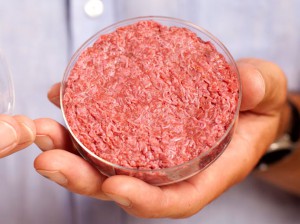Should Humanists Eat Synthetic Meat?

Science is both amazing and useful, as we constantly hear about new scientific innovations that help us to live longer, healthier, and happier lives, and about new scientific discoveries that give us an insight into the workings of the universe.
Continuing the proud scientific tradition of awe-inspiring innovation and discovery are the advancements made in the creation of synthetic meat. In August a team of scientists grilled some hamburgers that were made from meat grown in laboratories, and the repercussions of this cookout are as numerous as the sesame seeds on the hamburger buns.
Let’s begin by considering the impact of synthetic meat on the environment. A report by the UN’s Food and Agricultural Organization stated that “livestock production is one of the major causes of the world’s most pressing environmental problems, including global warming, land degradation, air and water pollution, and loss of biodiversity… livestock are responsible for 18 percent of greenhouse gas emissions, a bigger share than that of transport.” Imagine the impact synthetic meat will have on the environment when rainforests and other ecosystems don’t have to be cleared to allow livestock to graze, and how much less pollution and greenhouse gas emissions will occur when massive livestock farms are no longer required in order to sate the world’s hunger for meat.
The impact on animals and their ability to lead lives free from overcrowding and needless pain is also something to consider, although humanists are divided on whether or not animal rights should be a part of humanist principles. While it’s unlikely that everyone will give up “natural meat” for synthetic meat that is grown from stem cells, the vast majority of livestock will be able to lead more natural lives because of the viability of synthetic meat than the ones they currently lead on what are essentially meat production factories. Another benefit would be the ability of suffering vegetarians that crave hamburgers to eat one without feeling that their nourishment is coming at the price of animal suffering.
But perhaps most important impact of synthetic meat would be on the malnourished and underfed. The United Nations Food and Agriculture Organization estimates that nearly 870 million people are suffering from chronic undernourishment, with a large part of the undernourishment resulting from a lack of protein. While synthetic meat is currently too expensive to be sent around the world to those that are hungry, in the future it has the potential to seriously help nearly a billion people recover from their malnourishment without forcing them to destroy their local environment to raise livestock.
While synthetic meat may be a bit of a ways off from appearing on store shelves or being delivered to those in need, the research being done on the topic is extremely promising and signals that synthetic meat is a viable alternative to “natural” meat. It may take us all a bit to get used to the idea, but synthetic meat is a boon for humanity as we work to ensure that our planet and its inhabitants, be they human or animal, can lead good and healthy lives.
